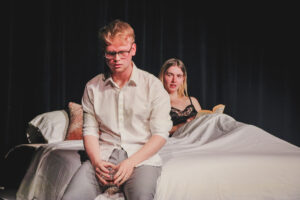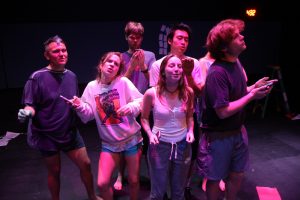Performance is coming back to Georgetown.
After a year of green screen set displays and actors talking through the borders of Zoom boxes, theatre is returning to, well, not always theaters. As actors, dancers, singers, and improvisers prepare to close their laptops and take the stage, they are met with a supporting cast of vanishing budgets and repurposed rehearsal spaces.
At the start of a semester marked by all-around uncertainty, some performing arts groups on campus have found their previously-held performance and practice spaces repurposed, rendering them unusable or insufficient for accommodating new COVID-19 regulations. Student organizations are also adjusting to a new budget model and restrictions on ticket sales, leaving some groups significantly underfunded and slashing show budgets.
Leadership concerns about space and funding coincide with an influx of new and returning students experiencing in-person campus arts and clubs for the first time. “It’s kind of an unfortunate time for us to be uncertain of how we can use our funds and expand our community and our outreach,” Ava Gaus (COL ’23), the business manager of nomadictheatre, said in an interview with the Voice.
Although the Performing Arts Advisory Council (PAAC), which allocates funds to the groups, has a similar budget compared to pre-pandemic years, their new model for allocating funds separates performances into tiers based on size and perceived financial need. Confusion over the new model has been exacerbated by the loss of emergency funding over the course of the pandemic. Mask and Bauble Dramatic Society (M&B), for example, lost $15,000 worth of stocked-up donations.
While the new model is intended to increase equity among performance-based clubs, not all performing arts groups benefit from it. Some, including the Georgetown Improv Association and M&B, have lost a significant amount of funding, mostly due to the loss of ticket revenue but also the PAAC budget cuts.
“Normally we only request about $100 over what our ticket sales cover. I think everything was cut down to like about 25 percent of what we would normally spend,” Anna November (COL ’22), the business manager of the Improv Association, said. “So it has been a pretty significant cut, but it’s not only been to us, it’s to all of the performing arts programs.”
M&B is also struggling to make the smaller budget work. They are expecting a budget of just $1,400 for one of their shows—a significant amount of money, but far less than a major theatrical performance often requires.
“We’re not broke, but it is significantly less than we’re used to. We can do fundraising. The concern is how will we retain that money,” M&B executive producer Liz McDermott (SFS ’22) said. “So we can certainly adjust and we won’t be canceling anything, but we’re just working with a lot less wiggle room than we’re used to.”
While Georgetown Event Management Services (GEMS) is in charge of assigning spaces for co-curricular organizations to meet, PAAC allocates each group’s overall budget. GUSA’s Financial Appropriations Committee (FinApp) is responsible for distributing a $1.9 million budget among the various advisory boards on campus, including PAAC.
“PAAC works just like any of the other advisory boards. We allocate funding to our groups throughout the year. And then from there we have ad hoc funding requests,” Olivia Kleier (SFS ’22), who serves as both PAAC co-chair and GUSA FinApp chair, said.
The change in budget model this year aims to remedy inequalities among performance groups under the previous model. “Every club is now getting the same amount of money, and it’s equitable. And it’s fair based on the level of production they’re doing,” the Department of Performing Arts (DPA) technical advisor Toby Clark said. “Some clubs are bigger and some clubs are smaller, so some will do fewer productions. Some will do more productions, but on the whole, the way the money is distributed is much more fair than it has been in the past.”
A small-scale reading, for example, would be classified under the first tier, while a large-scale, high-tech production would be classified under the third tier (or fourth, a spot reserved for high-tech musicals specifically). In addition to a more equitable distribution of funds, Clark hopes that this model will allow increased freedom for groups to use their budgets as they wish—under the previous system, PAAC would instead approve an itemized list of needs at the beginning of the academic year.
The new funding model is complicated, however, by DPA chair Derek Goldman’s decision to end ticket sales, meaning performance groups are now unable to charge student audience members for entry. This change was made after clubs requested their initial budget, so it was not factored into requests for the year, leaving many clubs in an unexpected financial hole.
The goal of the new rule, according to Clark, is to increase accessibility to art and theater for all students, regardless of their ability to pay. Nevertheless, it also removes a significant source of external funding for student groups.
“We’re not going to be charging for in-person tickets. Without that, we lose not the majority, but a huge portion of our funding,” Kleier said. It is possible for groups to earn revenue in other ways, like by charging audience members outside the Georgetown community for tickets, according to Clark. But without clear university policies for live Georgetown audiences during the pandemic, let alone community access to on-campus performances, the idea is unlikely to supplant traditional ticket sales. Currently, no one may attend a show that is not a Georgetown community member.
“We can’t guarantee that audiences are going to be able to come, let alone pay $10 for a ticket,” Clark said. He suggested optional donations, rather than mandatory ticket fees. “The hope is that we can create a more present donation system or sort of pay-as-you-go model.”
Despite these changes, much of PAAC’s funding is still distributed on an as-needed basis, according to Kleier. When groups are in need of funding for specific items, they can appeal to PAAC for more. PAAC, however, has communicated to student leaders that they have a very limited amount of money remaining.
“If a group doesn’t receive enough money for a certain production or something, they can apply for more money. And we have a reserve where we try to save some of our allocated budget for those expenses that we couldn’t have predicted during the budget summit,” Kleier explained.
But the appeals process also perplexes many performing arts club leaders. Club organizers must email the administrative director of the DPA, Ron Lignelli, to request more funds and hope he agrees with their need. There is no straightforward process for requesting a larger budget outside Lignelli’s discretion. Additionally, the groups collectively lost $300,000 in the PAAC emergency reserve fund, which they have maintained for years, meaning they can no longer rely on what was a constant cushion, according to club leadership.
“We have, for the most part, been told to wait a while until we see sort of how this semester goes in order to maybe hear about increasing funding for next semester,” Gaus said.
Along with budgetary challenges, clubs face uncertainty regarding access to necessary practice and performance spaces and the COVID-19 regulations they will need to uphold. Even theatre clubs that will retain their previously-held spaces must socially distance actors and may be required to put on a show without audience members, though groups still lack clear guidance on this. nomadictheatre, which will put on the musical Cabaret this semester, is still figuring out how to perform the show while following COVID-19 protocols, including a current DPA rule communicated to club leaders that actors still need to maintain three feet of distance.
“That definitely faces us with some challenges, especially with Cabaret, which is such a sort of a physically intimate musical. We’re figuring out how to create a sense of intimacy being three feet apart,” Gaus, who is also working as Cabaret’s choreographer, said.
For the Improv Association, their ability to rehearse and perform at all is threatened by the current use of Bulldog Alley. The Alley, a multipurpose space in the Leavey Center that once held a small group of hilarious, upbeat improvisers for their frequently sold-out performances for the Georgetown student body, today holds 45 student desk chairs. Improv has resorted to rehearsing in classrooms, parks, and basements, none of which are ideal show locations.
Clubs will also have to choose between rehearsing and performing outside, where they may have to cope with unfavorable weather, or inside, where mandatory masks would hide performers’ facial expressions. “It’s not as fun to watch when the performers are masked. So we’re hoping to do something outside where we can be unmasked. But we haven’t found a designated space yet,” November said.
While Clark asserts that groups can reserve outdoor and indoor spaces for rehearsals and performances, confusion regarding how to book reservations is widespread, as the GEMS system is currently blocking many student reservations.
“We tried to reserve a space outside—like the Leavey terrace and the Leavey esplanade—but there’s not an available way to reserve that yet. So there’s lots of questions about where we might end up,” November elaborated.
“We’re going to reuse materials. We’re going to be more creative in our problem solving. We’re still going to be able to do good theater,” Clark said. “We’re just going to do it in a more responsible, economical way. And so from my perspective, that’s the direction that we should be heading.”
One of the ways they hope to accommodate space and budget concerns is through greater collaboration across groups. Several clubs within the department already have plans in place to collaborate through joint productions between co-curricular groups and with the department.
“We’re all doing things together to lessen the overall load, which has actually been really great and something that I think theatre groups have been working towards for a while,” McDermott said.
The Black Theatre Ensemble (BTE) has adjusted to the decreased budget in another way. During the pandemic, they shifted much of their focus to the virtual sphere, building a website and newsletter, and conducting extensive research on the history of BTE. They hope to continue their online efforts, meaning that a reduced budget will likely not affect them to the extent that it has groups hoping to put on larger performances this year. BTE is also collaborating with other theater clubs to put on co-productions throughout the year.
“The budget cuts weren’t very noticeable because we had already decided on going a different route with our events. So having the budget as a smaller portion just resonated with our ideas and what we were doing,” Iliana Diaz (COL ’23), business manager of BTE, said.
Regardless of their format, performing arts organizations invite all members of the community to attend performances in any way they can—virtually, outdoors, or on the stage—at no cost.
“It’s tough that we have such a strict budget to sort of rebuild a club after a year and a half of not doing a lot, because improv is so much about the in-person experience,” November said. “But this is a time when people especially need a laugh.”
nomadictheatre will be performing Cabaret on November 9-10. Mask and Bauble will be putting on Machinal on October 28-31 and November 3-6. And the Black Theater Ensemble and Mask and Bauble will be collaborating on Night of Black Musical Scenes on October 22-24.
Editor’s note: This article was updated to include a statement from Goldman.




